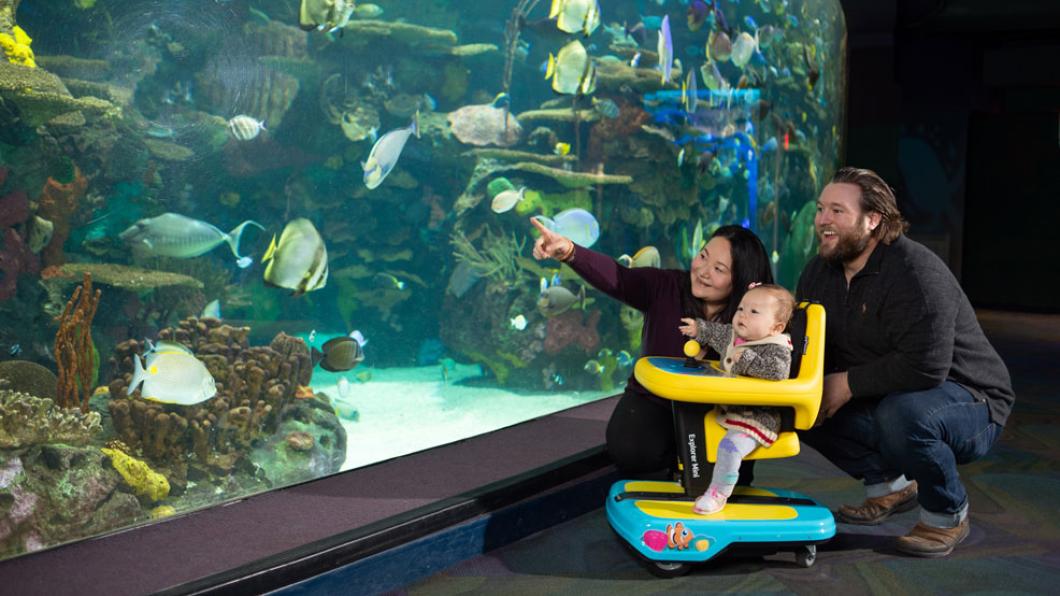
Baby on board: A joystick and wheels help tiny tots with motor impairments get into mischief
By Louise Kinross
A motorized chair that a baby with disabilities controls with a joystick to explore their environment was named one of the best inventions of 2021 by Time magazine.
The Explorer Mini, by Swedish wheelchair-maker Permobil, looks a bit like the top of a high chair transplanted onto a base with small wheels. It's bright yellow and light blue with images of sea creatures and looks more like a toy than a medical device. It has a tray and the seat can be raised or lowered so the child can bear weight. It costs US$2,695.
Cole Galloway, a scientist and physical therapist at the University of Delaware, was on the design team. You may remember him from this 2016 BLOOM interview when he described Go Baby Go, his grassroots research and advocacy group that adapts toy ride-on cars for babies with disabilities as young as six months. "Self-initiated mobility drives cognitive and social abilities and it's not the mode of mobility that matters, it's the dosage and the enriched environments," Cole says.
Cole has published studies showing developmental gains in pre-crawling babies who were given robots they could drive with a joystick. A recent study showed motor improvements in babies with Down syndrome who were given a Go Baby Go ride-on toy they control while seated or standing.
"Activity that's self-initiated jumpstarts their development," Cole says. "They realize quickly that 'I can move the world with my movement. I have agency and independence.' The brain wants to drive and move in different ways, and be able to go to multiple places. Families need their children actively moving via whatever modes are available throughout the day within the first year. Waiting into the second and third years of life is simply a failure of providing the human right of mobility. When we don't give a kid a wheelchair until they're three years old, it's a failure."
One of the advantages of the Explorer Mini is that it weighs 52 pounds and can be thrown in the back of a car. A standard child's power wheelchair can weigh about 150 pounds and requires a van and a ramp to travel. "The Explorer Mini allows the baby to drive in multiple environments and to go to places like Wal-Mart and the park," Cole says. "With most power chairs, families end up leaving them at home or at school because it's so difficult to get them in and out of the van."
Because the Explorer Mini has a zero-turn radius, "you can have the baby in the kitchen and they can learn how to bump and drive around in that small space. We want the brain to be interacting and getting into trouble and problem-solving."
Cole says neurotypical kids are active up to 80 per cent of their waking hours. "Children who will never walk, or walk at later ages, need the very same daily doses of self-directed play to develop, which is where motorized devices become critical."
Cole says fears that a motorized chair will make it less likely that a child will walk are unfounded. "If you're working on walking with your child one hour a day, you have other supplements like the Mini Explorer to get your child moving and making decisions at other times. You need both."
The Explorer Mini was the first device of its kind approved by the U.S. Food and Drug Administration. It requires a prescription from a physical or occupational therapist and is targeted to kids aged one to three. Cole hopes children's rehab clinics will buy a few chairs and loan them to families to try at home for a couple of weeks.
"Most of the scientists looking at early mobility via technology are adopters of Go Baby Go and are looking at pushing the medical and technology pipeline to create cheaper, more fun play devices," Cole says. "Once kids and families get used to the Explorer Mini, the industry will have to create more user-friendly, kid-appropriate wheelchairs in their lines. By building smaller mobile play toys, the toy industry is already overlapping and challenging the medical industry."
Like this interview? Scroll down to the blue banner and sign up for our monthly BLOOM e-letter. It combines family voices and expert advice on parenting children with disabilities, plus news, opinion pieces and new books.